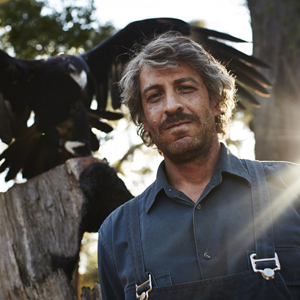An injured bird of prey
Lawyer Sarah Greer finds in the new Australian film Healing a prison story neither depressing nor didactic but thought provoking and quintessentially Australian.

Lawyer Sarah Greer finds in the new Australian film Healing a prison story neither depressing nor didactic but thought provoking and quintessentially Australian.
To continue reading the rest of this article, please log in.
Create free account to get unlimited news articles and more!
Healing opens with a tense sequence of a wedge-tailed eagle on the hunt juxtaposed with images of a group of criminals, some presumably predators themselves, being transported to Won Wron Correctional Centre, a low security prison farm in regional Victoria.
Healing is a film of uncommon beauty and intelligence which explores crime and punishment, family relationships, racism, religion, recidivism, grief, love and hope. Directed and co-written by The Interview's Craig Monahan, it stars Don Hany in his first lead film role.
One of the new arrivals is Viktor Khadem (Hany), an Iranian Australian who has served an 18-year sentence for murder and is to serve his final year before becoming eligible for parole here. He may or may not have knocked off a fellow prisoner at Pentridge prison. He appears to be brutal and intimidating. He gives good side-eye.
Viktor bears weathered skin, a resigned hunch and a world-weary shuffle. He has, it seems, given up, on life, on love and his faith. He is crippled with hopelessness, shame and guilt. He seethes and spits.
However, it soon appears that Viktor may not be all badass. Discovering the aforementioned eagle now enmeshed in a fence, Viktor gently helps free the bird and swaddles, rocks and soothes it like a baby. Thereafter, Viktor and his case worker, Senior Officer Matt Perry – played perfectly understatedly by Hugo Weaving – negotiate an arrangement whereby Viktor is put in charge of a raptor rehabilitation program, from selecting its prisoner staff to building the requisite aviaries and, most importantly, in charge of caring for Yasmine, the magnificent wedge-tailed eagle. This newfound autonomy both enlivens and frightens Viktor.
For his crew, Viktor chooses fellow newbie Paul Atherton (played by a compelling Xavier Samuel) and potential troublemaker Shane Harrison (Mark Leonard Winter, at once slightly menacing, endearing and absurd).
Good versus evil
Both are, like Viktor, grappling with the aftershocks of their crimes. Through these two characters, the veracity of the common prison refrain "my crime was an accident/it wasn't my fault" is tested and the course of taking responsibility for one's own actions navigated. They challenge us to consider whether each prisoner is truly bad, bad-turned-good or good-turned-unlucky.
Monahan and his co-writer Alison Nisselle do not shy away from putting overtly racist slurs in their characters' mouths. The vile Warren (Anthony Hayes) is the ringleader of the anti-migrant, anti-Muslim, anti-everything-but-Warren sentiment. Viktor too has his own views of his fellow inmates.
When uttering his broken English, Viktor seems impenetrable and quite often threatening. He is at his most tender, transparent and vulnerable when speaking to Yasmine in his native Farsi, the language of his long-lost home and love lives. Hany relied on Iranian members of his extended family to perfect his accent; indeed, if the accent of my Persian friend's grumpy father is representative, he has nailed it.
Viktor’s first foray into day release, a train trip to Melbourne's CBD, is terrifying and disorienting. He is understandably perplexed when a tattooed Gen Y flips him the bird. His second attempt at freedom, just for a day, brings him to tears. Throughout this episode, Hany conveys all of Viktor's terrible suffering, frustration, loneliness, regret and self-loathing without saying a word.
Even before the film's completion, Monahan and Nisselle's screenplay won the Gadens Queensland Literary Award for Feature Film Script. In different creative hands, Healing could have been a gruelling morality tale. Told as it is, the story's power lies in its light touch and restraint. The many parallels between man and bird need no exposition.
The handful of scenes depicting the raptors devouring their prey with Attenboroughesque realism are necessary, as evidence of the birds' readiness for release and are presented as no more and no less than the natural order of things.
While dealing with important ideas about right and wrong, Healing’s conscious refusal to preach, underestimate its audience's intelligence or answer its own questions is maintained to the end. Without disclosing the film's conclusion, it restores our faith in humanity and, momentarily, our justice system.
Healing opens nationally on Thursday 8 May 2014.
Image of Don Hany courtesy of Pinnacle Films.
Sarah Greer is a qualified solicitor. She has worked for Channel 9 and as a lawyer with both national and boutique firms and for an international insurer.






